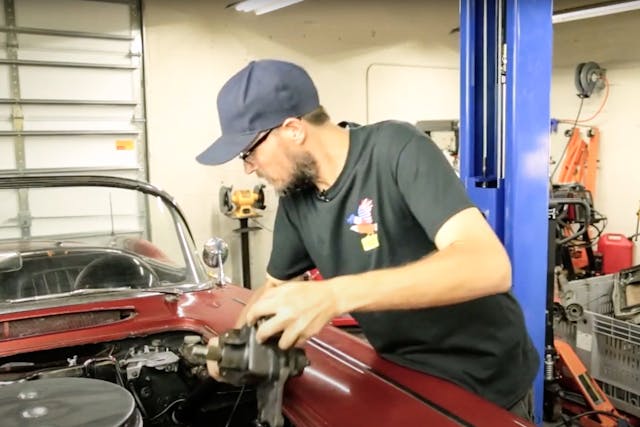Media | Articles
Corvette Conversions: Steering solutions and fuel gauge fixes

This week, “The Hack Mechanic” answers questions from Hagerty Drivers Club magazine:
Eric Weil writes: I have a ’62 Corvette. As my wife and I age, the standard steering is getting to be too much. I’m considering converting to power steering, but I am uncertain if I should convert to electric power assist or to standard power steering requiring a new power brake cylinder.
Rob Siegel answers: You have three options: 1) Fit a pump and a power-assisted steering box to the original front end; 2) Fit an electric assist to the original front end; or 3) Replace the front end with a power-assisted rack-and-pinion unit. Like many things, it comes down to effort, complexity, cost, and how far you want to move away from originality.
The electric power-steering assist kits are the least invasive, as they use an electric motor mounted in the steering column under the dash and leave the rest of the steering alone. The EPAS Performance kit costs about $1450 but requires cutting your existing steering column. For about $2300, the EZ Electric Power Steering kit comes with its own integrated column, letting you stash your original one. The Steeroids gives you pump-driven power assist and updates the entire steering of the car, replacing the steering box and kingpins with a rack-and-pinion setup, reportedly eliminating the bump steer associated with the original system. At $3500, however, it ain’t cheap.
If you’re satisfied with the way the car steers, the existing steering is in good shape, and you want to make only minimal changes from stock, then I’d go with the electric EZ system. If, however, the front end needs rebuilding anyway, and you want power assist with generally improved steering, check out the Steeroids system.
Marketplace
Buy and sell classics with confidence

Jim McDougal writes: I have a problem with the fuel gauge in my ’61 Corvette. For a few years, it read OK when the car was stopped but bounced around between accurate and full when the car was moving. It now always registers full when the ignition is on. I have tried to jumper the gauge ground, but that didn’t work. The sender unit checks out fine. Taking the gauge out is doable but difficult, so any ideas are appreciated.
Rob answers: You say the gauge is no longer bouncing, but a jumpy gauge is a common problem in C1 Corvettes, caused by the use of a shared ground between the tank and the rear lights. The fix is to jumper not the gauge but the sender—to give it its own dedicated ground connected directly to clean metal on the frame. You need to isolate the problem to the gauge, the sender, or the wiring. Check the back of the gauge. The “I” terminal should be receiving 12 volts. The “S” terminal should be connected to the brown wire from the sender, which provides a variable resistance between it and ground. Zero resistance should read empty; 30 ohms or more should read full.
You can test the gauge by disconnecting the brown wire from the “S” terminal and cracking the key. With it disconnected, it should read full. Then connect a jumper wire from the “S” terminal to a perfect ground and crack the key. It should read empty. The problem may simply be that there’s not a good connection between the gauge and the sender, or between the sender and ground.
***
Rob Siegel’s latest book, The Best of the Hack MechanicTM: 35 years of hacks, kluges, and assorted automotive mayhem, is available on Amazon. His other seven books are available here, or you can order personally inscribed copies through his website, www.robsiegel.com.



The term ‘kingpin’ is grossly antiquated. I think the author is referring to the Corvette’s front suspension knuckles. Hard to say for sure.
Until 1962 the Corvette retained the early ’50’s Chev front independent suspension. No balljoints, kingpin spindle on a trunnion mounted upright.
https://www.motortrend.com/how-to/c1-corvette-1953-to-1962-front-suspension-rebuild/